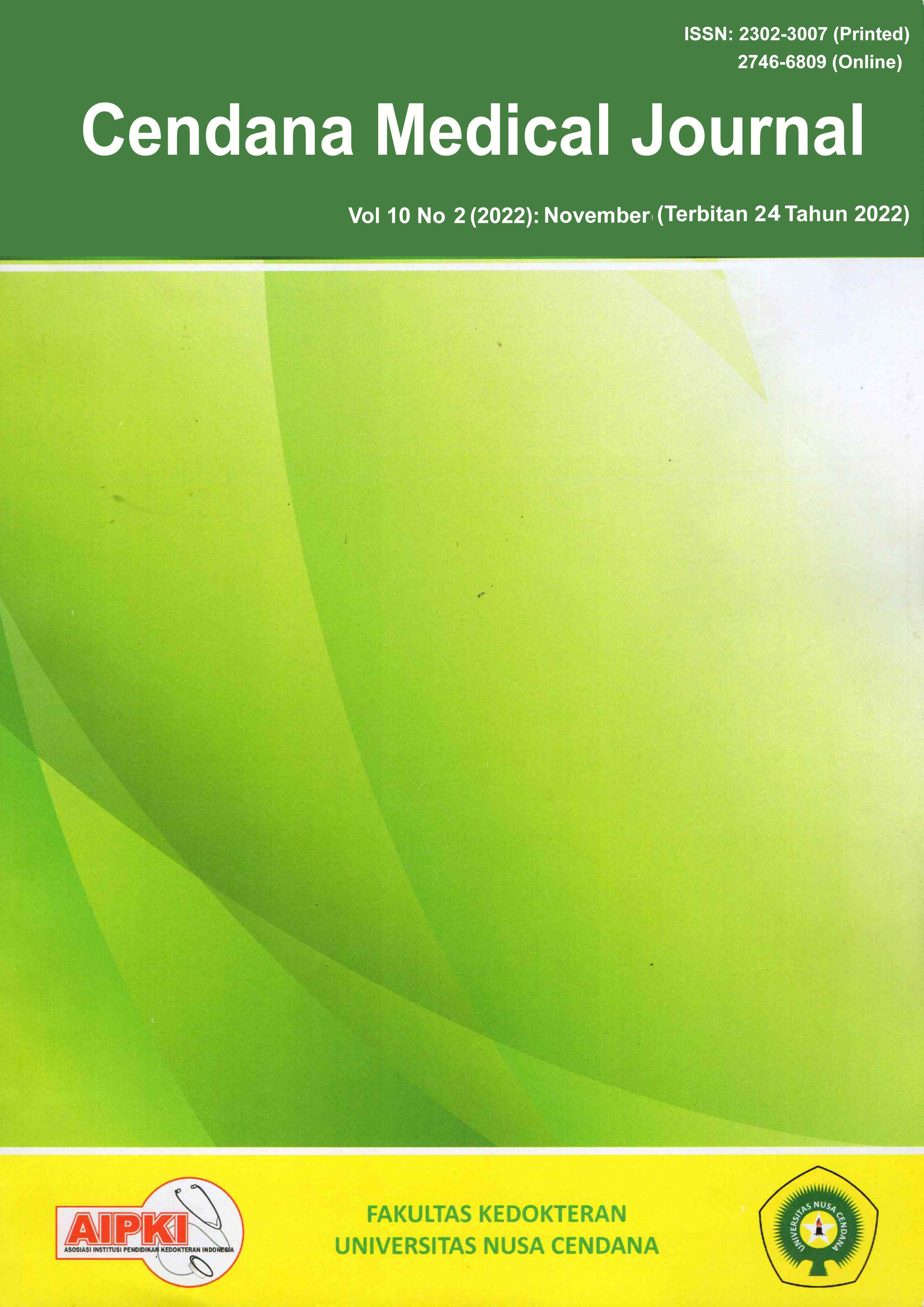CORRELATION BETWEEN INTERNET ADDICTION LEVELS WITH DEGREE OF DEPRESSION ON PRECLINICAL STUDENTS FACULTY OF MEDICINE
Abstract
Background: Internet in the millennium era is used as a tool for exchanging information and a media for communication on a large scale, therefore it becomes a necessity in our daily life. According to the Indonesian Internet Service Users Association (APJII), the largest number of internet users in Indonesia are students, including medical students, compared to adolescents and the general population. There are many conveniences offered by the internet, but the excessive use of it will cause an adverse impact on human health. Internet addiction that occurs from excessive internet use is closely related to mental health disorders such as depression.
Objective: To analyze the correlation between internet addiction levels with degree of depression on preclinical students Faculty of Medicine.
Methods: This study was an observational analytic study with a cross sectional design conducted on preclinical students Faculty of Medicine Nusa Cendana University by filling in the Young's Internet Addiction Test (YIAT) questionnaire and the Patient Health Questionnaire–9 (PHQ-9). The sampling technique used purposive sampling with 80 respondents who met the inclusion and exclusion criteria. The study was analyzed univariately, and bivariately using Spearman test.
Results: It was found that from 80 respondents there were 25 respondents (31.3%) with mild internet addiction, 51 respondents (63.8%) with moderate internet addiction, and 4 respondents (5.0%) with severe internet addiction. And from 80 respondents observed, 41 respondents (51.3%) experienced mild depression, 13 respondents (16.3%) experienced moderate depression, 4 respondents (5.0%) experienced severe depression, and 22 respondents (27.5%) were not depressed. The results of the bivariate analysis test in this study obtained p value = 0.000 (p <0.05).
Conclusion: There is a significant and a strong correlation between internet addiction levels with degree of depression, which indicates that the higher the level of internet addiction the higher the degree of depression on preclinical students Faculty of Medicine class of 2017, 2018, and 2019.
Downloads
References
2. Clement, J. Countries with The Highets Number of Internet Users in 2019. 2020; Diakses melalui: https://www.statista.com/statistics/262966/number-of-internet-users-in-selected-countries/.
3. Asosiasi Penyelenggara Jasa Internet Indonesia. Penetrasi dan profil prilaku pengguna internet Indonesia tahun 2016 dan 2018. 2016;2018.
4. Ching, S. M., Awang, H., Ramachandran, V., Mohd, S., Lim, S., Aliaa, W., Hoo, F. Prevalence and factors associated with internet addiction among medical students - A cross-sectional study in Malaysia. 72(1), 7–11;2017.
5. Simanjuntak, Y. Hubungan Adiksi Internet Dengan Anxietas Pada Mahasiswa Fakultas Kedokteran Universitas Sumatera Utara. 2017.
6. Sari MI, Lisiswanti R, Oktaria D. Pembelajaran di Fakultas Kedokteran : Pengenalan bagi Mahasiswa Baru Learning in Medical Education : Introduction for New Medical Students. 2016;1:399–403.
7. Yudaristy H, Irfanuddin, Azhar MB. Persepsi Mahasiswa dan Dosen Tentang Ketercapaian Kompetensi Dasar dan Klinis Pendidikan Dokter di Fakultas Kedokkteran Universitas Sriwijaya. J Kedokt dan Kesehat. 2014;1(1):25–33.
8. Mulyani, R. Hubungan Antara Depresi Dan Kecanduan Online Game Pada Mahasiswa Di Yogyakarta;2018.
9. Ummu, SL. Hubungan Adiksi Internet Dengan Tingkat Depresi Pada Mahasiswa Fakultas Kedokteran Universitas Sumatera Utara Angkatan 2013-2014. 2017.
10. Boonvisudhi T, Kuladee S. Association between Internet Addiction and Depression in Thai Medical Students at Faculty of Medicine , Ramathibodi Hospital. 2017;1–10.
11. Aditiantoro M, Swasti M. Pengaruh Problematic Internet Use dan Regulasi Diri Terhadap Prokrastinasi Akademik Mahasiswa Program Studi Psikologi Fakultas Kedokteran Universitas Udayana. 2010;000:205–15.
12. Anand AN, Cherian A V, Thomas C. SC. Internet Use Behaviors, Internet Addiction and Psychological Distress among Medical College Students: A Multi Centre Study from South India. Asian J Psychiatr [Internet]. 2018; Available from: https://doi.org/10.1016/j.ajp.2018.07.020
13. Sokang YA. Mahasiswa dan Internet : Dua Sisi Mata Uang ? Problematic Internet Use pada Mahasiswa. 2016;43:107–20.
14. Evren B, Evren C, Dalbudak E, Topcu M, Kutlu N. The Impact of Depression, Anxiety, Neuroticism, and Severity of Internet Addiction Symptoms on The Relationship between Probable ADHD and Severity of Insomnia among Young Adults. 2018; Available from: https://doi.org/10.1016/j.psychres.2018.12.010
15. Chou W, Yen C, Liu T. Predicting Effects of Psychological Inflexibility / Experiential Avoidance and Stress Coping Strategies for Internet Addiction , Significant Depression , and Suicidality in College Students : A Prospective Study. 2018:1–11.
16. World Health Organization. Depression and Other Common Mental Disorders Global Health Estimates. 2017. Diakses melalui: https://www.who.int/health-topics/depression#tab=tab_2 dan https://www.who.int/news-room/fact-sheets/detail/depression.
17. Raharjo S. Cara Melakukan Uji Statistik Deskriptif dengan Software SPSS. 2015 http://www.spssindonesia.com/2014/01/uji-statistik-deskriptif-spss.html
18. Rachmawati D. Hubungan Kecanduan Internet Terhadap Interaksi Sosial Remaja. 2018.
19. Javaeed A, Zafar MB, Iqbal M, Ghauri SK. Correlation between Internet Addiction , Depression , Anxiety and Stress among Undergraduate Medical Students in Azad Kashmir. Sari, Wahyu. Hubungan Antara Tingkat Adiksi Internet Dengan Derajat Depresi Pada Siswi Di Smk 1 Batik Surakarta. 2017.
20. States U, Brody DJ, Pratt LA, Ph D, Hughes JP. Prevalence of Depression Among Adults Aged 20 and Over : 2018;(303):2013–6.
21. Graziottin A, Serafini A. Depression and the menopause: why antidepressant are not enough?. Menopause International 2009:16;76-81.
22. Jaya SP, Wardani ND, Jusup I. Hubungan Intensitas Penggunaan Situs Jejaring Sosial Dengan Depresi Pada Mahasiswa Tingkat Akhir. 2016.
23. Pratama R. Hubungan Tingkat Depresi, Cemas, Dan Stres Dengan Intensitas Bermain Video Game Sebagai Strategi Coping Pada Mahasiswa Fakultas Kedokteran Universitas Muhammadiyah Palembang. 2019.
24. Dirgayunita A. Depresi: Ciri, Penyebab, dan Penangananya. 2016.
25. Nenobesi RR. Hubungan Tingkat Kuliah dengan Tingkat Depresi Pada Mahasiswa Preklinik Fakultas Kedokteran Universitas Nusa Cendana Semester Ganjil Tahun Akademik 2017/2018.2018;94-100
26. Sabu EF. Analisis Faktor Resiko Yang Mempengaruhi Kejadian Depresi Pada Mahasiswa Fakultas Kedokteran Universitas Nusa Cendana. 2020.
27. Puspita, KD. Hubungan Kecanduan Internet Dengan Depresi Pada Mahasiswa Fakultas Kedokteran Universitas Pelita Harapan Usia Muda 18-29 Tahun. 2018.
28. Istiqomah S. Keterkaitan Compulsive Gamer dan Gangguan Pada Sistem Limbik Otak Dalam Pembelajaran Keagamaan Islam. MUADDIB: Studi Kependidikan Dan Keislaman Vol. 09 No. 02. 2019;
29. Love T, Laier C, Brand M, Hatch L, Hajela R. Neuroscience of Internet Pornography Addiction: A Review and Update. Behavioral Sciences. 2015;388–433.
Copyright (c) 2022 Cendana Medical Journal (CMJ)

This work is licensed under a Creative Commons Attribution-NonCommercial-NoDerivatives 4.0 International License.
Copyright Notice

This work is licensed under a Creative Commons Attribution 4.0 International License.

 Lintang Briliana Aristia(1*)
Lintang Briliana Aristia(1*)












